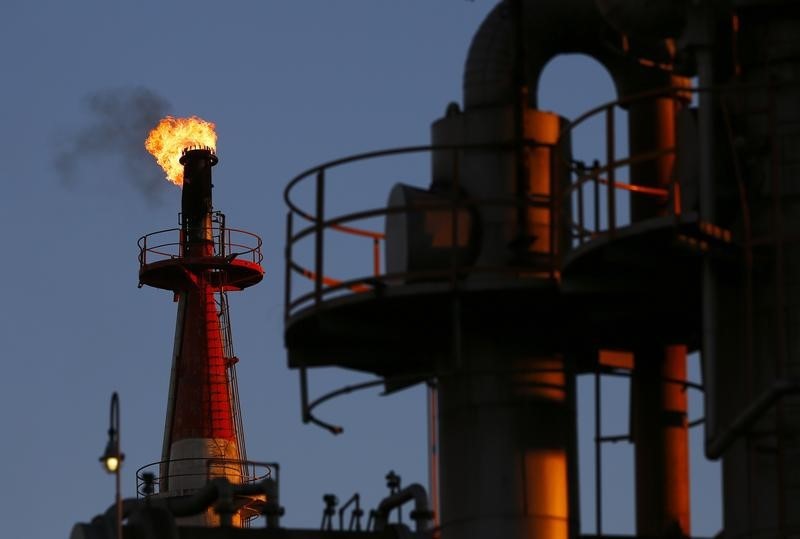* U.S. crude output jumps to record 11.35 mln bpd in Aug -EIA
* U.S. doesn't want to harm allies with Iran sanctions -Bolton
* U.S. crude stocks rose 3.2 mln bbls last week - EIA
* Russian, Saudi and U.S. oil production at record highs (Updates with settlement price; adds commentary, market activity)
By Stephanie Kelly
NEW YORK, Oct 31 (Reuters) - Oil prices fell on Wednesday and posted the worst monthly performance since mid-2016 on evidence of rising global crude supply, but losses were limited by signs of strong U.S. demand for fuel.
The Brent crude December LCOc1 futures contract, which expired Wednesday, fell 44 cents to settle at $75.47 a barrel. The more-active January contract LCOF9 fell 91 cents to settle at $75.04 a barrel.
West Texas Intermediate (WTI) crude CLc1 futures fell 87 cents to settle at $65.31 a barrel.
Both benchmarks were more than $10 a barrel below the four-year highs reached on Oct. 3. They both posted their worst monthly performance since July 2016, with Brent falling 8.8 percent for the month and WTI dropping 10.9 percent.
Investor sentiment across risky asset classes, such as equities and energy, turned negative during the month as U.S.-China trade tensions sparked demand worries.
Weighing on market sentiment on Wednesday were signs of rising global output. U.S. crude oil production surged by 416,000 barrels per day (bpd) to a record 11.346 million bpd in August, the U.S. Energy Information Administration said. United States and other top producers Russia and Saudi Arabia pumped 33 million barrels per day in September, Refinitiv data showed, an increase of 10 million bpd since the start of the decade.
Russian oil output has reached 11.41 million bpd in October, a level unseen since the collapse of the Soviet Union in 1991, an industry source told Reuters. increases in production comes just ahead of new U.S. sanctions on Iran, set to come into force Nov. 4, that are expected to cut supply.
"There's this perception that there's enough oil in the market right now to get through the Iranian sanctions," said Phil Flynn, analyst at Price Futures Group in Chicago.
Washington has made it clear to Tehran's customers that it expects them to stop buying any Iranian crude oil from that date.
However, on Wednesday U.S. national security adviser John Bolton said that while the United States wants to apply maximum pressure on Iran with sanctions on its crude exports, it does not want to harm countries that are friends and allies that depend on the oil. of Iranian crude by major buyers in Asia hit a 32-month low in September as China, South Korea and Japan sharply cut their purchases ahead of the sanctions, government and ship-tracking data showed. in the session, oil prices gained after the U.S. Energy Information Administration said crude inventories USOILC=ECI rose 3.2 million barrels last week, less than expected. Gasoline and distillate stockpiles fell as total product demand over the past four weeks rose 5.4 percent from a year ago. EIA/S
"Bullish draws to the products have acted as a counterweight to bearish sentiment," said Matt Smith, director of commodity research at ClipperData.
Oil market sentiment received some support from equity markets, which pulled back from 20-month lows after pledges by China to support its markets. have been under pressure from the trade war between the world's two largest economies, the United States and China.
The United States has imposed tariffs on $250 billion worth of Chinese goods and China has responded with retaliatory duties on $110 billion worth of U.S. goods.
